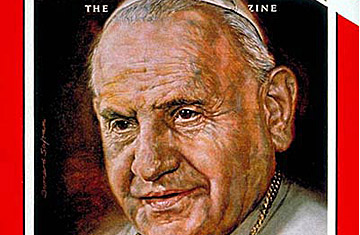
Pope John XXIII
(2 of 7)
Now it is clear that the matter is by no means settled. Catholic scholars are deeply involved in new Biblical studies—sometimes over the objections of the Holy Office—that are giving them new insights into the nature and form of revelation and bringing them into intellectual cooperation with Protestant scholars. Was there really a star of Bethlehem? Were there really wise men from the East? Some scholars, in their efforts to plumb the positive depths of meaning in the Scriptures with tools of modern critical research, are willing to question these revered ideas. A new generation of Catholic thinkers, particularly in Europe, has been finding new approaches to theology and, in the case of the late Paleontologist Pierre Teilhard de Chardin and others, new meanings in science. It is the genius of Pope John XXIII that he sensed that the time was ripe for internal renewal in the church, and opened the way for it.
Too Many Bulges. It was a major accomplishment that the Vatican Council ever got going at all. The Curia clearly did not want it. One Curia man, according to a Vatican story, told the Pope: "We can't possibly get a council ready by 1963." "All right," said John, "we'll have it in 1962."
When the Curia cardinals finally decided that John really meant to have a council, they staffed the preparatory commissions with Curia men and decided that the council would be conducted entirely in Latin without simultaneous translation —thus effectively cutting off many Latin-shy bishops from the proceedings. In preparing the 69 proposals to be discussed at the council (since reduced to 20), they followed their own theologically conservative bent, frequently ignored the suggestions that the Pope had asked the world's bishops to submit.
Pope John let the Curia have its way. To Boston's Richard Cardinal Cushing, he explained: "Sono net sacco qui"—"I'm in a bag here." But when the council fathers arrived in Rome, they began getting discreet telephone calls from Monsignor Loris Capovilla, the Pope's private secretary, subtly disassociating the Pope from the Curia. The progressives among the bishops correctly deduced that John wanted a wholesale reform, but they did not at first realize their own strength. Gradually, encouraged by the knowledge that the world was watching, they became emboldened. "We heard men dare to say things we'd privately been thinking for a long time ourselves," a U.S. bishop said. Britain's Archbishop T. D. Roberts remonstrated that the conservative Ernesto Cardinal Rufini could "get up in St. Peter's and say that Christ's bride, the Church, is already without spot or wrinkle—but I say she's still got bulges in all the wrong places."
Against Old Ideas. The first council session discussed five subjects, ranging from church unity to mass media, but the key battles were fought over three important schemata, or proposals:
∙THE FORM OF WORSHIP. By a vote of 1,922 to 11, the council fathers approved liturgical
